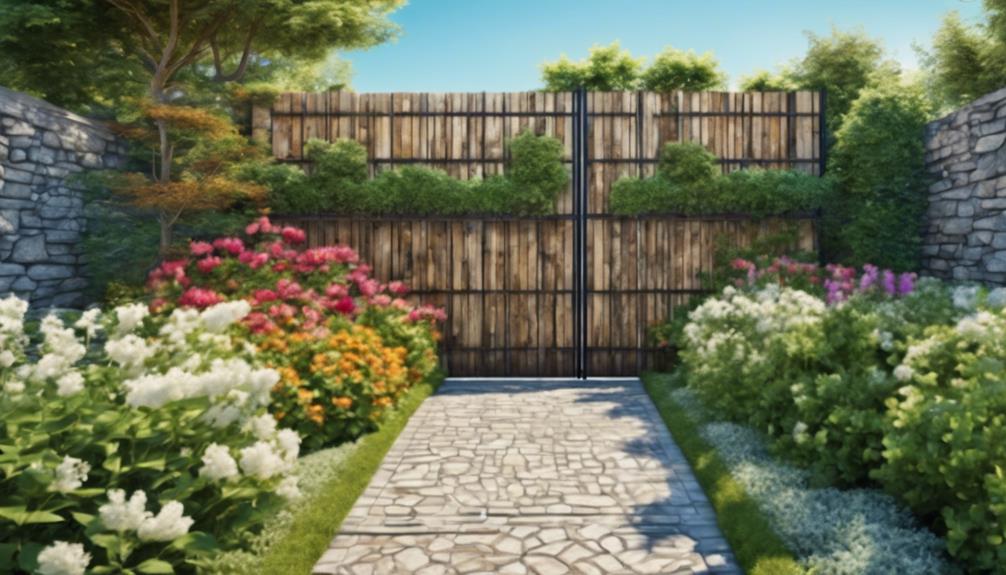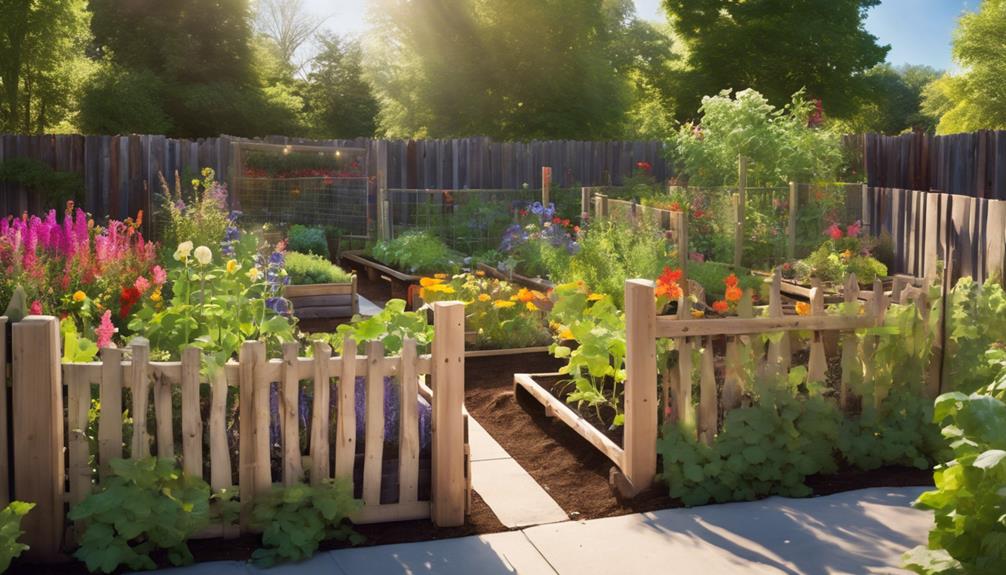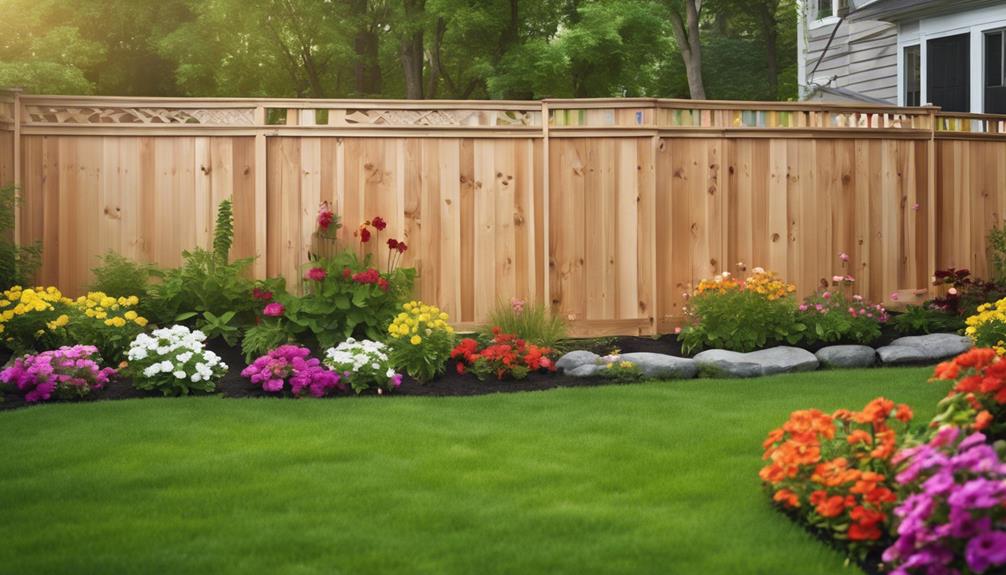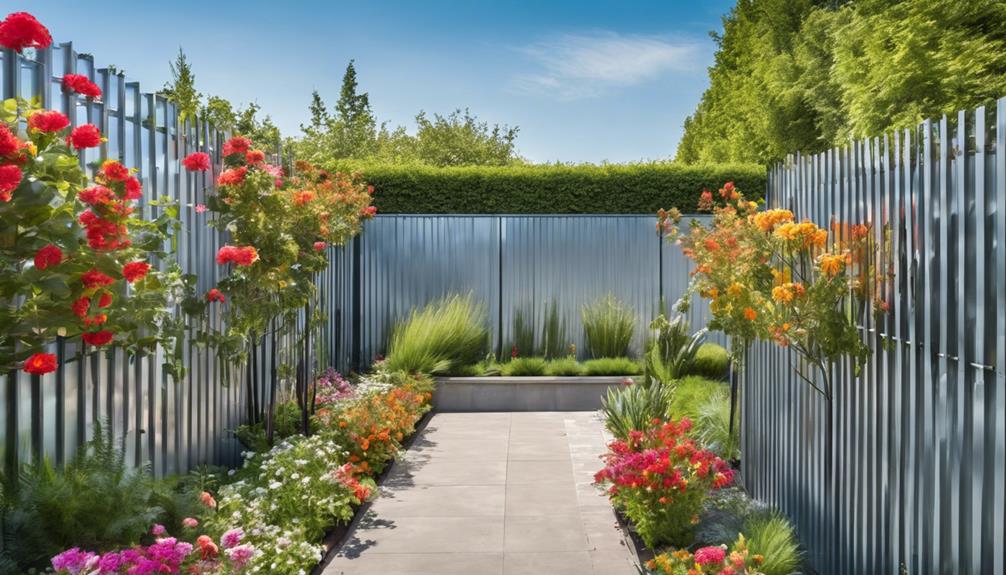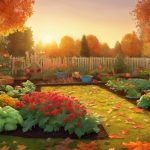
3 Best Tips for Vegetable Garden Cleanup
25 February 2025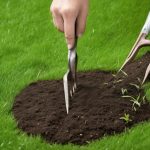
5 Best Lawn Renovation Services for Neglected Yards
26 February 2025When selecting garden fencing materials, consider durability, aesthetics, and maintenance.
Vinyl offers longevity with minimal upkeep, making it ideal for a range of climates.
Metal options like aluminium and wrought iron provide strength and corrosion resistance.
Pressure-treated timber can last decades but requires regular maintenance.
Composite materials deliver the appearance of wood with improved weather resistance.
Assess your budget alongside initial costs and long-term value, and factor in local climate conditions for optimal performance.
Choosing the right materials is crucial for enhancing your property's appeal and functionality; further insights can guide your decision-making process effectively.
Material Durability and Aesthetics
When selecting garden fencing materials, both durability and visual appeal are essential factors to consider.
Long-lasting options, such as vinyl or metal, can withstand the elements while maintaining their structural integrity over time.
Furthermore, the aesthetic qualities of these materials should complement the overall design of the garden, enhancing its beauty while providing essential security.
Long-lasting Material Options
While aesthetic appeal is significant, the durability of garden fencing materials is a critical consideration for homeowners looking to invest in a long-lasting solution.
Among the most resilient options are vinyl and metal, both of which offer exceptional longevity and require minimal maintenance. Vinyl fencing, resistant to rot and fading, can withstand harsh weather conditions, making it ideal for varied climates.
Metal options, such as aluminium and wrought iron, provide strength and security while resisting corrosion.
Another durable choice is pressure-treated wood, which, when properly maintained, can last for decades.
Ultimately, selecting a long-lasting material involves balancing durability with practical maintenance needs, ensuring your investment withstands the test of time while maintaining functional integrity.
Visual Appeal Considerations
Enhancing the visual appeal of garden fencing requires a thoughtful balance between material durability and aesthetic design. The choice of materials greatly influences not only the longevity of the fence but also its contribution to the overall landscape.
For instance, natural wood offers a warm, organic look but demands regular maintenance to prevent deterioration. Conversely, metal options such as wrought iron provide a sophisticated elegance and unparalleled durability, although they may require protective coatings to prevent rust.
Composite materials can emulate the appearance of wood while offering superior resilience against weathering. Ultimately, the selection should reflect both personal taste and the surrounding environment, ensuring that the fence complements the garden while standing the test of time.
Cost and Maintenance Considerations
When selecting garden fencing materials, cost and maintenance considerations play a vital role in the decision-making process.
Factors such as weather resistance and longevity impact not only the initial investment but also the long-term upkeep required.
Furthermore, evaluating the ease of installation and the environmental impact of materials can further inform your choice, ensuring it aligns with both budget and sustainability goals.
Weather Resistance and Longevity
Frequently, homeowners overlook the critical role that weather resistance and longevity play in selecting garden fencing materials. A well-chosen fence not only enhances aesthetic appeal but also withstands the elements, ensuring lasting protection for your garden.
To master this selection, consider the following factors:
- Material Durability: Opt for materials such as vinyl or metal that resist rust and decay.
- Weather Resistance: Select treatments that protect against moisture, UV rays, and temperature fluctuations.
- Maintenance Requirements: Evaluate the upkeep needed to preserve the fence's integrity over time.
- Environmental Adaptability: Consider local climate conditions to ensure the material performs at its best.
Understanding these elements will empower you to make informed decisions that benefit your garden for years to come.
Installation Ease and Flexibility
When selecting garden fencing materials, the ease of installation and flexibility are essential factors that can significantly influence your overall experience and costs.
Choosing materials that are straightforward to install can considerably reduce both labour expenses and the time required for installation.
Here are four key considerations:
- Material Weight: Lighter materials, such as vinyl, often require less effort to handle and install.
- Modular Options: Prefabricated panels can streamline the installation process, allowing for quick adjustments.
- Tool Requirements: Some materials may necessitate specialised tools, which can increase costs; simpler installations might only require basic tools.
- Adaptability: Flexible materials can easily accommodate changes in design or landscape, enhancing long-term usability.
Environmental Impact Considerations
A significant aspect of garden fencing materials is their environmental impact, which encompasses both cost and maintenance considerations.
Selecting eco-friendly materials not only reduces your carbon footprint but can also lead to long-term savings. Here are key factors to evaluate:
- Sustainability: Opt for renewable resources such as bamboo or reclaimed wood.
- Durability: Choose materials that minimise replacement frequency, thereby reducing waste.
- Maintenance: Assess the need for chemical treatments, which can harm local ecosystems.
- Lifecycle Analysis: Evaluate the environmental cost of production, transportation, and disposal.
Choosing the Right Tools
When selecting tools for your garden fencing project, it is crucial to take into account the specific style of fencing you plan to install.
Regular inspections for damage will also require appropriate tools to ensure longevity and durability.
Furthermore, if you are opting for a custom fencing design, having the right tools can facilitate more precise and efficient execution.
Select Your Fencing Style
How do you determine the ideal fencing style for your garden? Selecting the right style involves a blend of aesthetics, functionality, and environmental considerations.
Here are four key factors to guide your decision:
- Purpose: Define the primary function of your fence—privacy, security, or decoration.
- Material Compatibility: Ensure the fencing material complements the garden's landscape and existing structures.
- Local Regulations: Check zoning laws and homeowners' association guidelines that may dictate specific styles or heights.
- Maintenance: Consider the upkeep required for each style; some may need regular treatment, while others are more low-maintenance.
Regularly Inspect for Damage
Regular inspections of your garden fencing are essential for maintaining its integrity and appearance over time.
To ensure longevity and functionality, adopt a systematic approach to your inspections. Consider the following key aspects:
- Structural Integrity: Check for any leaning or sagging sections that may require reinforcement.
- Material Condition: Look for signs of rot, rust, or corrosion, particularly in wooden or metal fences.
- Fasteners and Connections: Examine nails, screws, and hinges to verify they are secure and intact.
- Pests and Wildlife: Inspect for any signs of infestation or damage caused by animals, which can compromise the fencing's effectiveness.
Custom Fencing Design Strategies
In designing custom fencing for your garden, selecting the right tools is crucial to guarantee both precision and efficiency in your project.
Employing the appropriate instruments not only enhances the quality of your work but also streamlines the process.
Consider the following key tools:
- Measuring Tape: For accurate measurements to ensure proper fit and alignment.
- Level: To maintain a straight and even fence line, preventing visual discrepancies.
- Post Hole Digger: Essential for creating consistent and clean holes for posts.
- Power Drill: Facilitates quick assembly of panels and fittings, boosting overall productivity.
Utilising these tools will empower you to create a custom fence that is both functional and aesthetically pleasing, reflecting your unique style and design vision.
Enhanced Property Value
Investing in high-quality garden fencing materials can significantly enhance property value, making it a crucial consideration for homeowners. A well-selected fence not only boosts curb appeal but also provides security and privacy—elements that are highly sought after in the real estate market. Below is a comparative analysis of different fencing materials and their impact on property value:
| Material | Cost Range | Value Increase |
|---|---|---|
| Wood | £15 – £30/ft | Moderate |
| Vinyl | £20 – £40/ft | High |
| Chain Link | £10 – £25/ft | Low |
| Composite | £25 – £50/ft | High |
Choosing the right material aligns with both aesthetic preferences and financial investment, positioning your property for strong market appeal.
Garden Design and Layout
Incorporating vertical garden support systems, such as trellises for climbing plants, can considerably enhance both the aesthetic appeal and functionality of your garden layout.
Furthermore, strategically positioned garden fencing not only provides privacy but also complements the entire design.
Vertical Garden Support Systems
Vertical garden support systems play a crucial role in optimising space and enhancing aesthetics in garden design.
By utilising vertical elements, gardeners can maximise limited areas while creating visually appealing landscapes.
Consider these four key benefits of integrating vertical support systems:
- Space Efficiency: Vertical systems allow for increased planting density, maximising the use of available ground space.
- Improved Air Circulation: Raising plants improves airflow, reducing the incidence of disease and promoting healthier growth.
- Aesthetic Appeal: Vertical structures add dimension and interest, transforming an ordinary garden into a stunning visual display.
- Accessibility: Elevated gardens reduce strain during maintenance, making gardening more accessible for individuals of all abilities.
Implementing vertical support systems can greatly enhance your garden's functionality and beauty.
Vertical Trellis for Climbing Plants
Utilising trellises for climbing plants can significantly enhance garden design and layout, providing both functional support and aesthetic appeal.
A well-constructed vertical trellis not only optimises space but also enriches the visual dynamics of your garden.
When selecting a trellis, consider the following:
- Material: Choose between wood, metal, or plastic based on durability and style.
- Height and Width: Ensure that the dimensions align with the growth habits of your chosen plants.
- Design: Select a structure that complements your garden's aesthetic—be it rustic, modern, or ornate.
- Maintenance: Consider the upkeep required for different materials to guarantee longevity.
Incorporating a vertical trellis into your garden layout promotes healthy growth while elevating visual interest.
Garden Fencing for Privacy
When considering garden design and layout, effective fencing plays a crucial role in ensuring privacy while enhancing the overall aesthetic of the space.
Selecting the right materials and styles can create a tranquil environment, shielding you from prying eyes.
Here are four ideal fencing options for privacy:
- Wooden Panels: Classic and versatile, wooden panels can be customised for height and design, offering substantial seclusion.
- Vinyl Fencing: Durable and low-maintenance, vinyl provides a clean appearance while effectively blocking views.
- Bamboo Fencing: An eco-friendly option, bamboo lends a tropical feel and can be woven for added density.
- Hedging: While not traditional fencing, dense hedges can serve as a natural barrier, beautifully integrating with your landscape design.
Choose wisely to enhance both privacy and visual appeal.
Fencing Material Selection Issues
Selecting the appropriate fencing material involves balancing material strength with aesthetic appeal, ensuring that the chosen option complements the garden's design while providing necessary security.
Moreover, understanding the local pest population is essential, as certain materials may suffer from deterioration or damage over time.
Exploring pest-resistant material options can improve longevity and maintain the fence's appearance, ultimately contributing to the garden's overall health and beauty.
Material Strength Versus Aesthetic Appeal
While the choice of garden fencing materials often hinges on the balance between material strength and aesthetic appeal, it is essential to recognise that these two factors can significantly influence both functionality and visual harmony in outdoor spaces.
Selecting the right fencing material requires thoughtful consideration of the following:
- Durability: Assess how well the material withstands environmental stressors.
- Visual Integration: Ensure that the fence complements the existing landscape and architecture.
- Maintenance Requirements: Consider the ongoing upkeep needed to preserve aesthetic qualities.
- Cost Efficiency: Evaluate the long-term investment against initial material costs.
Striking the right balance between these elements not only enhances the garden's beauty but also guarantees a robust and enduring fencing solution.
Durability Against Local Pests
Considering the diverse range of local pests that can threaten the integrity of your garden, selecting a fencing material with sufficient durability becomes paramount. The right material not only deters pests but also prolongs the lifespan of your fencing.
When assessing durability against pests, consider the following factors:
- Material Composition: Certain materials are more resistant to gnawing and burrowing than others.
- Resistance to Decomposition: Fencing that can withstand moisture helps deter mould and insect infestations.
- Height and Structure: Taller, solid fences can prevent larger animals from accessing your garden.
- Maintenance Requirements: Durable materials necessitate less frequent replacement, thereby minimising long-term costs.
Pest-Resistant Material Options
In relation to ensuring the longevity of your garden fencing against pests, the choice of material plays a crucial role.
Selecting pest-resistant materials can greatly mitigate damage and maintenance costs. Here are four effective options to consider:
- Composite Fencing: Made from a blend of wood fibres and recycled plastics, composite materials resist rot and insect damage.
- Vinyl Fencing: Durable and non-porous, vinyl is impervious to termites and other pests, requiring minimal upkeep.
- Metal Fencing: Options such as galvanised steel or aluminium provide robust barriers against physical pest intrusion.
- Treated Wood: Utilising pressure-treated wood can improve resistance to termites and decay, extending the lifespan of your fence.
Why Choose TKL Birmingham Gardener
Choosing TKL Birmingham Gardener for your garden fencing needs guarantees a combination of quality, expertise, and exceptional customer service.
Renowned for their meticulous craftsmanship, TKL Birmingham Gardener employs skilled professionals who understand the intricacies of fencing installation and maintenance. Their commitment to using premium materials ensures that your fencing not only meets aesthetic standards but also withstands the test of time and environmental challenges.
Furthermore, TKL offers tailored solutions, allowing you to select fencing that complements your garden's unique character while fulfilling functional requirements.
With a focus on customer satisfaction, their team provides comprehensive support throughout the decision-making process, ensuring that your investment enhances the beauty and security of your outdoor space.
Trust TKL Birmingham Gardener to elevate your garden fencing experience.
Common Fencing Material Questions
Numerous homeowners and gardeners frequently encounter questions when selecting the right fencing materials for their outdoor spaces.
Common inquiries often revolve around durability, maintenance requirements, and aesthetic compatibility with existing landscapes. For instance, many seek to understand the lifespan of wood versus vinyl, with wood requiring regular treatment to resist rot, while vinyl offers low-maintenance longevity.
Furthermore, concerns about environmental impact prompt questions about sustainably sourced materials. Budget considerations also arise, leading to comparisons between initial costs and long-term value.
Homeowners may wonder about local regulations or restrictions regarding height and style, as these can greatly influence choices. Addressing these questions thoroughly can empower individuals to make informed decisions that align with their specific needs and preferences.
Final Material Recommendations
When selecting the ideal fencing material for a garden, it is essential to consider a variety of factors that align with the specific needs and preferences established in previous discussions.
Based on durability, aesthetics, and maintenance, the following recommendations are made:
- Vinyl: Offers a low-maintenance, weather-resistant solution with a diverse range of design options.
- Wood: Provides a classic appearance but requires regular maintenance to preserve its integrity.
- Chain Link: An economical choice that offers visibility and security, suitable for larger spaces.
- Composite: Combines the aesthetic appeal of wood with the durability of synthetic materials, ideal for eco-conscious gardeners.
Each option presents unique advantages, ensuring that your garden fencing aligns with your vision and requirements.

